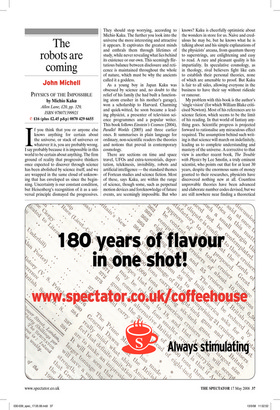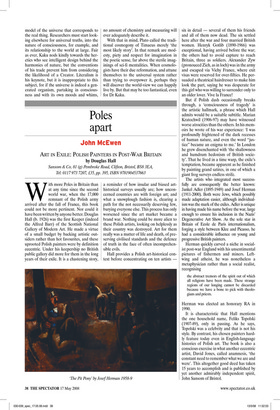The robots are coming
John Michell
PHYSICS OF THE IMPOSSIBLE by Michio Kaku Allen Lane, £20, pp. 329, ISBN 978071399921 ✆ £16 (plus £2.45 p&p) 0870 429 6655 If you think that you or anyone else knows anything for certain about the universe, or stack of universes or whatever it is, you are probably wrong. I say probably because it is impossible in this world to be certain about anything. The firm ground of reality that progressive thinkers once expected to discover through science has been abolished by science itself, and we are wrapped in the same cloud of unknowing that has enveloped us since the beginning. Uncertainty is our constant condition, but Heisenberg’s recognition of it as a universal principle dismayed the progressives. They should stop worrying, according to Michio Kaku. The further you look into the universe the more interesting and attractive it appears. It captivates the greatest minds and enthrals them through lifetimes of study, while never revealing what lies behind its existence or our own. This seemingly flirtatious balance between disclosure and reticence is maintained throughout the whole of nature, which must be why the ancients called it a goddess.
As a young boy in Japan Kaku was obsessed by science and, no doubt to the relief of his family (he had built a functioning atom crusher in his mother’s garage), won a scholarship to Harvard. Charming and quick-witted, he soon became a leading physicist, a presenter of television science programmes and a popular writer. This book follows Einstein’s Cosmos (2004), Parallel Worlds (2005) and three earlier ones. It summarises in plain language for ordinary, non-scientific readers the theories and notions that prevail in contemporary cosmology.
There are sections on time and space travel, UFOs and extra-terrestrials, deportation, telekinesis, invisibility, robots and artificial intelligence — the standard themes of Fortean studies and science fiction. Most of these, says Kaku, are within the range of science, though some, such as perpetual motion devices and foreknowledge of future events, are seemingly impossible. But who knows? Kaku is cheerfully optimistic about the wonders in store for us. Naive and credulous he may be, but he knows what he is talking about and his simple explanations of the physicists’ arcana, from quantum theory to superstrings, are enlightening and easy to read. A rare and pleasant quality is his impartiality. In speculative cosmology, as in theology, rival believers fight like cats to establish their personal theories, none of which are amenable to proof. But Kaku is fair to all sides, allowing everyone in the business to have their say without ridicule or rancour.
My problem with this book is the author’s ‘single vision’ (for which William Blake criticised Newton). Most of his references are to science fiction, which seems to be the limit of his reading. In that world of fantasy anything goes. Scientific progress is projected forward to rationalise any miraculous effect required. The assumption behind such writing is that science will march on indefinitely, leading us to complete understanding and mastery of the universe. A corrective to that view is another recent book, The Trouble with Physics by Lee Smolin, a truly eminent scientist, who points out that for at least 30 years, despite the enormous sums of money granted to their researches, physicists have discovered nothing new at all. Countless unprovable theories have been advanced and elaborate number codes devised, but we are still nowhere near finding a theoretical model of the universe that corresponds to the real thing. Researchers must start looking elsewhere for universal truths, into the nature of consciousness, for example, and its relationship to the world at large. Fair as ever, Kaku nods kindly towards the heretics who see intelligent design behind the harmonies of nature, but the conventions of his trade prevent him from considering the likelihood of a Creator. Literalism is his keynote, but it is inappropriate to this subject, for if the universe is indeed a generated organism, partaking in consciousness and with its own moods and whims, no amount of chemistry and measuring will ever adequately describe it.
With that in mind, Plato called the traditional cosmogony of Timaeus merely ‘the most likely story’. In that remark are modesty, piety and respect for imagination in the poetic sense, far above the sterile imaginings of sci-fi mentalities. When cosmologists have their due reformation, and attune themselves to the universal system rather than trying to overpower it, perhaps they will discover the world-view we can happily live by. But that may be too fantastical, even for Dr Kaku.











































































 Previous page
Previous page